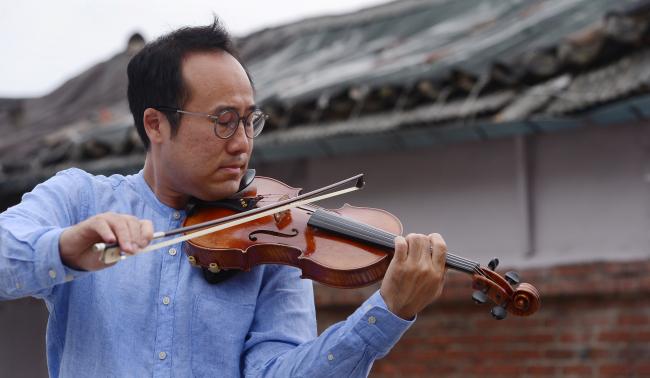Won Hyung-joon leads the Lindenbaum Festival Orchestra and hopes one day to perform together with North Korean musicians.
If Won Hyung-joon’s dream of forming an inter-Korean orchestra is ever realized, "Arirang" is an obvious choice for the playlist. It’s a traditional Korean folk song.
“It just touches our soul,” the South Korean violinist says. “It’s very sorrowful and feels like pain."
"Arirang" will be played as athletes from the North and South walk together during the opening ceremony of the Pyeongchang Winter Olympics on Feb. 9. And in lieu of both countries’ national anthems, the folk song will also be played at the start of ice hockey games involving the unified Korean women’s team.
As Won explains, "Arirang" dates back long before the peninsula was divided in 1945 and echoes the separation of tens of thousands of families who haven’t been able to reunite — like his own family.
“'Arirang' is the perfect song,” he says, for expressing the “tragedy” of the divided Korean peninsula.
Won, 41, recalls hearing stories as a child about his great-grandmother, who was separated from her son (his grandfather) during the Korean War. She remained on the North Korean side and they never saw each other again.
“I can’t even visit her tomb,” Won says, noting that it’s located in Kaesong, a city just on the opposite side of the demilitarized zone (DMZ) in North Korea.
Won’s family’s history underlies his efforts to achieve a kind of musical unification. For much of the past decade, he’s tried to put South and North Korean musicians together in the same room, but political tensions have often gotten in the way.
In 2015, Won devised a plan to bring a South Korean orchestra to the DMZ, where they would rendezvous with a North Korean choir: They would perform several meters apart from one another, separated by a fence.
“It’s the symbolic place of our division,” Won says, referring to the DMZ, adding that he intended for the two sides to perform Beethoven's Symphony No. 9 at the border.
Won learned from contacts in Europe that Pyongyang had agreed to the concert on Aug. 15, Korean Independence Day, and the authorities in Seoul granted him permission to enter the restricted area. But, when Won arrived at the border with a bus filled with musicians, South Korean soldiers broke the bad news.
“They said the peace concert had been canceled,” Won says.
Days earlier, a land mine explosion in the DMZ wounded two South Korean soldiers and tensions between the two countries rose sharply.
For Won, it was a reminder that the unresolved conflict between Seoul and Pyongyang continued to stand in the way of his ambitions.
“Honestly, I felt that maybe it’s our destiny, it’s Korean DNA; it’s our fault that we can’t make unification happen,” he recalls thinking at the time.
But Won didn’t give up. In August 2017, he took a group of about 80 musicians and singers back to the DMZ and this time they were able to perform, though without North Korean accompaniment.
And "Arirang" was on their set list.
oembed://https%3A//www.youtube.com/watch%3Fv%3D5s7t5O52Uvo%26feature%3Dyoutu.be
“We played near the fence [and] it was our wish that [the North Koreans] could hear 'Arirang' through [the] air,” he says.
Won says he’s not deterred by the setbacks. And he says that he hopes that the goodwill generated during the Pyeongchang Winter Olympics will open the door for his Lindenbaum Festival Orchestra to someday play alongside North Korean musicians.
He figures he owes it to his grandfather to keep trying.
